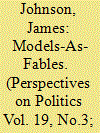| Srl | Item |
| 1 |
ID:
189458


|
|
|
|
|
| Summary/Abstract |
In an important subset of armed conflicts, there is a large disparity between the belligerents’ capabilities. Although the outcomes of such wars cannot be predicted with absolute certainty, the chances that a weak state will triumph are often so low that private information is not a satisfying explanation for conflict. Under which circumstances, then, does the disadvantaged side give in rather than attempting to fight? And what explains variation in effort levels by strong states? I present a model of an environment in which a strong state faces political pressure to replace the losing government following a costly war. I show that there is a non-monotonic relationship between the effort the winning state devotes to the war and the probability that the losing state surrenders – when war effort is low, the weaker state fights because it has a decent chance of winning; when it is high, the weak state fights because it recognizes that it will be replaced upon surrender. Further results are derived to explain the domestic political foundations of variation in strong states’ investments in lopsided conflicts. The results help rationalize a number of historical instances of lopsided conflict.
|
|
|
|
|
|
|
|
|
|
|
|
|
|
|
|
| 2 |
ID:
181547


|
|
|
|
|
| Summary/Abstract |
Political scientists invoke the standard rationale to justify making and using formal models. It goes like this: (1) we rely on formal models to generate predictions, (2) we treat these predictions as empirical hypotheses, and (3) we seek to test these hypotheses against evidence derived from the “real world.” I show that this interpretation of formal models as directly empirical is inadequate just insofar as it fails to capture the way we actually use them. I then offer an alternative rationale for making and using formal models. Specifically, I argue that we use models, like we use fables, for conceptual purposes.
|
|
|
|
|
|
|
|
|
|
|
|
|
|
|
|
| 3 |
ID:
145713


|
|
|
|
|
| Summary/Abstract |
What is the epistemological status of rational choice models in International Relations (IR) theory, and by what standards should they be evaluated? The literature using these models is becoming increasingly bifurcated between their use to generate predictive hypotheses, which are then evaluated by empirical, usually quantitative, analysis, and their use to contribute to a generalized deductive model of international politics based on the assumptions of rational choice theory, narrowly defined. A third use of these methods, as heuristic models, based on a Weberian philosophy of social science, remains an eminently useful tool in the study of IR, but is becoming increasingly marginalized. The application of evaluative standards designed for other uses of rational choice modeling is inappropriate to the use of this technique for heuristic purposes. An evaluative standard of usefulness in helping us to understand particular political events or discourses, rather than one of predictive accuracy or contribution to a broader effort to model IR, is appropriate for the heuristic use of rational choice models.
|
|
|
|
|
|
|
|
|
|
|
|
|
|
|
|